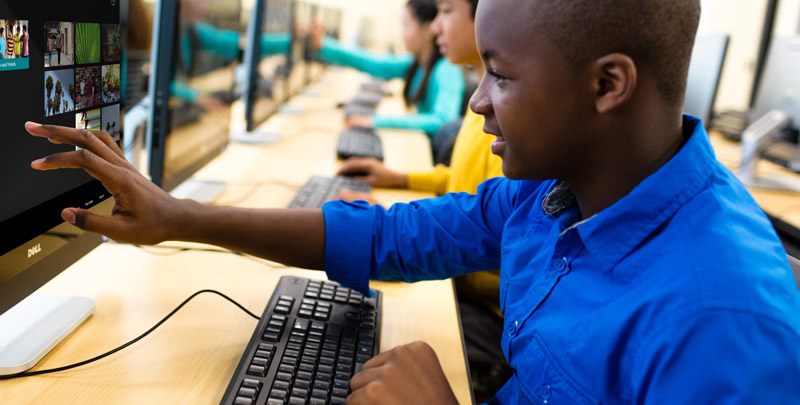Harb Bou-Harb, Senior Director: Education – Microsoft Middle East & Africa
Education systems around the world are integrating technological solutions into their classrooms in order to prepare today’s children for tomorrow’s jobs.
The 2018 Future of Jobs report released by the World Economic Forum (WEF), said that wholly new job roles such as AI and Machine Learning Specialists, Big Data Specialists, Process Automation Experts, Information Security Analysts, User Experience and Human-Machine Interaction Designers, Robotics Engineers and Blockchain Specialists are expected to be commonplace among enterprises in the years to come. Similarly, Microsoft research conducted in collaboration with McKinsey & Co, said that up to 375 million people will need to switch from the work they are doing today by 2030.
This means that today’s students need to be future-ready, equipped with traditional numeracy and literacy capability, as well as STEM and digital skills. Simultaneously, as routine work is automated and artificial intelligence (AI) augments employee capability, students need to develop competencies in problem-solving, collaboration and creativity.
But graduates are already ill-equipped for the current world of work. According to a PwC report, the gap between the skills of the current workforce and the skills businesses need to achieve their growth plans is widening, with 96 percent of CEOs in Africa saying the availability of key skills today is the biggest threat to their organisation’s growth.
According to the World Bank Group, this skills deficit limits opportunities for further education or training because the capacity to make up for lost skills shrinks over time. Second-chance adult education programs have limited success, and on-the-job training usually favours workers with more education and skills.
Consequently, as the WEF report states, policy-makers and educators need to play a fundamental role in developing new agile learners for these future workforces by tackling improvements to education and training systems.
Realising the opportunity of technology
It is evident that digital skills are becoming essential for the jobs of today and tomorrow. From digital literacy to computer science education, these skills can open the door to greater economic opportunity in the workplace of the future. Unfortunately, these skills are beyond the reach of too many young people across Africa. But through partnerships between technology companies and African governments, this is changing.
Microsoft believes in a future where every young person has the skills, knowledge and opportunity to succeed and has made a commitment to impart digital skills to 10 million youth in the region in the next three years. That is why Microsoft partners with governments, businesses and non-profit organisations to empower all youth to imagine and realise their full potential.
For example, in 2016, Microsoft worked closely with the Kenyan government to deploy a Digital Literacy Program in which more than 5 000 teachers were empowered to access the Microsoft Educator Community Platform. This partnership ensures that while students have access to technology from a young age, they will simultaneously have teachers who can leverage the technology effectively in the classroom.
The Ministry of Education in Rwanda also partnered with Microsoft in a similar transformative agreement that aims to impact over 65 000 teachers and 3.2 million students. This will be achieved through providing discounts on Windows devices and delivering educational content, professional development and certification for students and teachers, by leveraging the cloud and Office 365.
Now, Zimbabwe is looking to do the same. As part of the country’s Vision 2030, Zimbabwe is determined to build more schools (up to an additional 2000) and is aiming to expand the access of WiFi connectivity to all educational institutions. Zimbabwe is also implementing a new competence-based curriculum and has looked to partner with companies that can assist with the creation of e-content and introducing technology in the classroom.
Microsoft is assisting in this cause. At the upcoming Innovation Africa 2018 – Africa’s Official Ministerial Summit, the technology company will enter a Memorandum of Understanding (MoU) with Zimbabwe’s Ministry of Primary and Secondary Education that will see Microsoft commit to assisting the Zimbabwean government in crating modern classrooms that drive innovation, performance and growth.
As part of the agreement, Microsoft will assist the Zimbabwean Ministry in identifying the ideal devices for its specific digital education strategies. Microsoft will also assist the Ministry in building partnerships with international Original Equipment Manufacturers (OEMs) and provide consultancy services in building a local assembly strategy.
Benefits of a modern classroom
Technology has the power to inspire creativity, collaboration, performance and growth among learners and educators alike. By leveraging a modern productivity platform, African governments stands to inspire modern educational institutions that motivate innovation and productivity.
Microsoft’s productivity solution for educations has specialised benefits for educators, students, administrators and facilities. For instance, Microsoft recently announced a new set of educational products and services, inspired by teachers and learners. These include Windows 10 S, new experiences in Microsoft Teams, new features in Minecraft and mixed reality, as well as a range of devices suited specifically to education.
Another useful tool is the Unique ID and Student Management System, which assigns a unique ID for each student and manages student information in a single, centralised system. This way, all academic records and transactions – such as registered schools, transcripts, pass-fail status, attendance records etc. – are digitised and kept in one, central environment.
The future awaits
At Innovation Africa 2018, Microsoft EMEA Regional Business Leader Mark East will discuss these and other opportunities await Africa’s education sector in the Fourth Industrial Revolution.
Says East, “For Africa’s people to take their place in a 21st century global economy, the core ingredients to its digital education transformation recipe must include connectivity, digital literacy, the ability to code and command of the English language. Similarly, if we are to truly invest in the human capital of the future, we must prioritise the importance of Science, Technology, Engineering and Mathematics (STEM) learning for all K12 students. My talk will discuss these concepts in more detail.”
Innovation Africa 2018 takes place 28 – 30 November in Harare, Zimbabwe.





